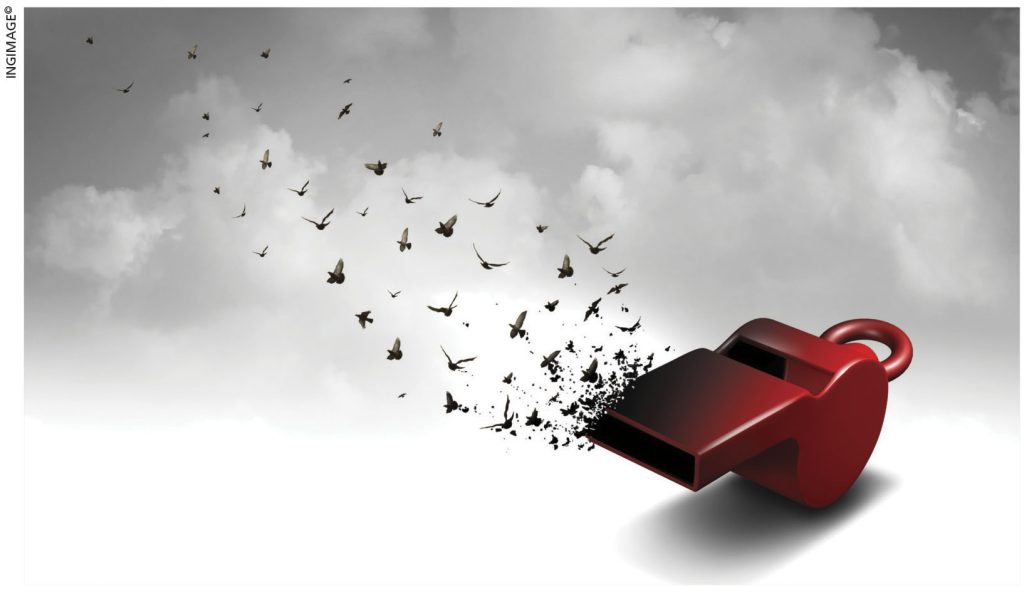CORPORATE GOVERNANCE
Our experience with Fortune 500 companies is that most of them are reluctant to implement healthy whistle blowing policies. This stems from a fear it might signal underlying governance issues.
Enronand Lehman Brothers still haunt corporate boards, which believe whistle blowing is a prelude to scandal rather than a safeguard against it.

WHISTLE BLOWERS AT WORK
Dr. Muneer Muhamed explains why reliable informants safeguard organisations

Whistle blowing, which concerns reporting misconduct or unethical behaviour in an organisation, remains a questionable act in South Asia.Cultural and religious aspects, fear of retaliation and weak legal protection deter speaking up.
There have been serious cases in Sri Lanka that could have been avoided with the right whistle blowing policies.
In 2015, the Central Bank of Sri Lanka bond scam demonstrated the absence of strong informant channels. Initial warnings by insiders about irregular bond auctions never surfaced formally, and it took external media leaks and a commission of inquiry to uncover the truth.
A few years ago, asenior officer of a state owned enterprise (SOE) attempted to raise concerns over fraudulent procurements. Fearing intimidation and job loss, the individual eventually went to the media instead of internal channels. This is how the lack of structured anonymous processes derail corporate governance.
And this isn’t confined to financial misconduct alone.
During the COVID-19 pandemic, medical staff anonymously used social media to highlight shortages of protective gear and oxygen, to force hospitals to act quickly and save lives.
The world over, whistle blowing has proven its mettle to prevent an escalation of risks. During the global financial crisis, Dubai witnessed how whistle blowers in real estate exposed fraudulent practices by developers. These informants reported misrepresentation of project status, which resulted in stricter regulatory oversight.
Kuwait Hidden Stories on Instagram exposed migrant labour abuses, which triggered official interventions. During the FIFA World Cup Qatar 2022, whistle blowers who sounded off on labour rights violations faced harassment but their actions pushed the Qatari government to drive reforms.
Though Sri Lanka is modest in scale, it mirrors similar structural hassles. Employees remain silent and wary of reprisals in the private and public sectors, due to a culture of professional hierarchies intertwined with personal networks.
Measures under the Assistance to and Protection of Victims of Crime and Witnesses Act No. 4 of 2015 currently offer very little protection for workplace whistle blowers.
Since a healthy workplace is built on trust, transparency and accountability, an effective whistle blowing policy is critical as it empowers employees to report wrongdoing without fear. When workers feel safe to speak up, unethical behaviour is naturally deterred.
Many companies have realised that adopting formal whistle blowing frameworks can gain credibility and resilience.
There are many benefits with a good policy. Early detection of misconduct prevents small infractions from escalating into financial or image crises. Enhanced corporate governance aligns organisations with best compliance standards, which lead to more investments and better retention of talent. Cost savings occur by avoiding legal penalties and public scandals.
A structured mechanism would have averted the Central Bank bond scam with timely alerts. And billions of rupees could have been saved without undermining market confidence.
There are many challenges as cultural norms in Sri Lanka equate whistle blowing with betrayal and tight job markets exacerbate fears of retaliation. Anonymous reporting is difficult to encourage in small organisations where voices are easily identified. Overcoming this requires cultural and legal shifts.
Here are some best practices for companies that seek to implement effective whistle blowing mechanisms.
CHANNELS Build confidential and anonymous channels to prevent identity exposure – establish secure hotlines, encrypted emails or third party platforms.
MEASURES Establish anti-retaliation measures and advocate for job security to prevent intimidation.
OVERSIGHT Set up impartial committees to ensure unbiased investigation of complaints.
COMMITMENT Ensure that senior executives visibly support ethics initiatives to signal seriousness.
FEEDBACK Even if allegations prove to be unsubstantiated, acknowledging reports builds credibility.
TRAINING Regular workshops reinforce that whistle blowing is a duty – not disloyalty.
REMEDIES Consider reinstatement, compensation or formal apologies to instill confidence in the system.
DISCOVERY There has to be proper documentation of every investigation and due adherence to guidelines.
POLICY AUDITS Periodic reviews will help ensure that practices are followed.
A strong policy isn’t costly; it is instead, aninvestment in integrity. Clearly, silence is costlier than speaking up. So build a culture where truth can traverse safely through the corridors of power.
Silence is costlier than speaking up

